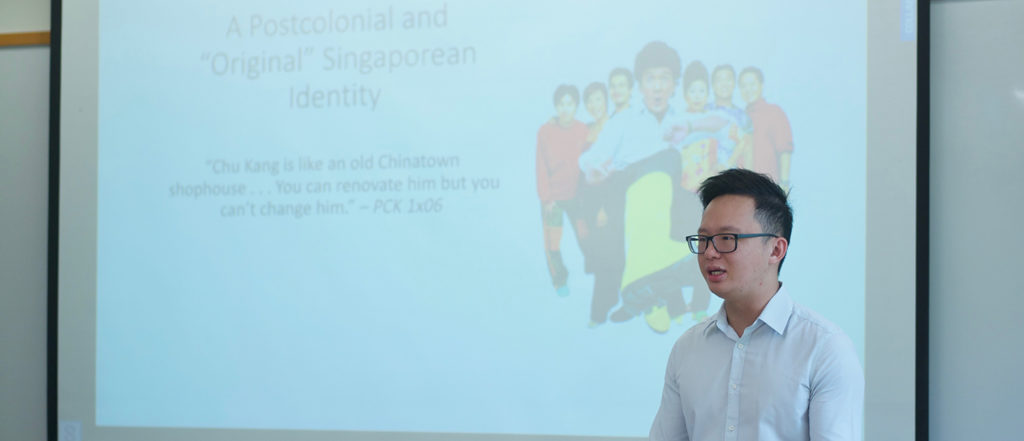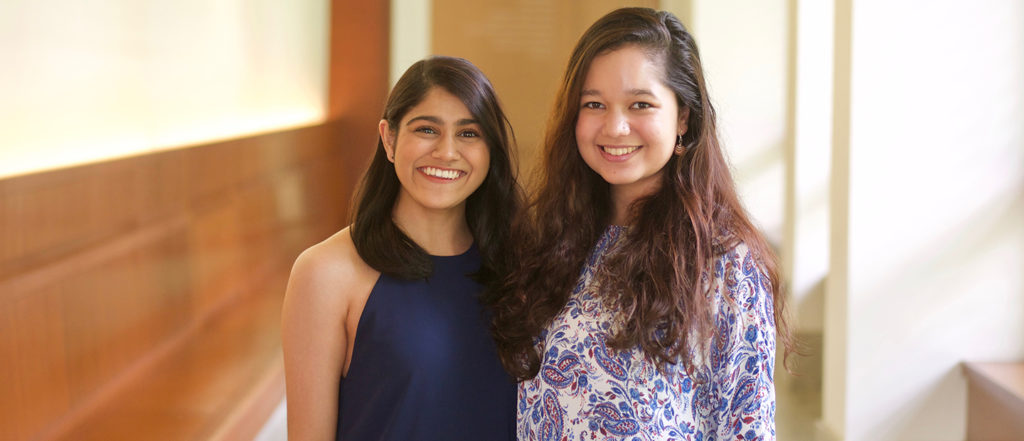Undergraduate researchers present capstone research at international conferences
Between March and April 2018, some students from the graduating Class of 2018 travelled abroad to present their capstone research at international conferences.
The capstone is a component of the Yale-NUS curriculum that final-year students undertake with the guidance of a Yale-NUS faculty adviser. Students conceive, design and execute a year-long, self-directed project to pursue, in depth, a topic of their own choosing within their major.
Benson Pang (Class of 2018, below) spent a week in the United Kingdom at the University of Edinburgh to present his capstone project at the Fourth Edinburgh Undergraduate Literature Conference. He attended the conference with Yogesh Tulsi (Class of 2020,), who presented a paper on West African genealogical novels which he had written for a Yale-NUS literature class.

An annual event hosted by the School of Literatures, Languages and Cultures, the conference caters to undergraduate students in literary studies from around the world, who come together to present their original research.
Titled “Phua Chu Kang and the ‘Don’t Play Play’ of Singaporean Identity”, Benson’s capstone examines Phua Chu Kang, an original Singaporean sitcom, as a “window into analysing how Singapore made sense of itself and its relationship to a shrinking world”.
“Phua Chu Kang is arguably Singapore’s most well-loved English sitcom but calling it an ‘English’ sitcom is actually an interesting way of describing the show, since most of the show’s dialogue might not even register as English to the non-Singaporean ear,” Benson shared.
Phua Chu Kang featured extensive use of Singlish, or Colloquial Singaporean English, which Benson explained is a uniquely Singaporean English variant with its own grammatical and lexical system.
He noted that this made the show revolutionary because it “transformed Singlish, which Singapore’s first Prime Minister Lee Kuan Yew famously called a ‘handicap’ to Singapore’s international reputation, into a focal point for patriotic pride.”
“My capstone examines how Singaporean authenticity is presented in Phua Chu Kang and attempts to unpack the many hidden claims about ‘true’ Singaporean identity that it makes,” he added.
A Literature major, Benson decided to focus on a medium different from the conventional written word that most would associate with the subject. He had two faculty advisors for the project, Assistant Professor of Literature Ma Shaoling and Associate Professor of Literature Geoffrey Baker.
“I believe that television, cinema and social media are on their way to becoming central pillars of our social imagination. Studies of literature—that is, studies of how humans tell stories that reflect their hopes and concerns—must expand to include new media if we want to keep our fingers on society’s pulse,” he said.
Cheryl Cosslett and Anjali Hazra (both Class of 2018) were in Chicago in early April for the 76th Midwest Political Science Association (MPSA) conference to present their capstone research as well.
 Anjali (left) and Cheryl (right).
Anjali (left) and Cheryl (right).
Cheryl is majoring in Politics, Philosophy & Economics (PPE) while Anjali is majoring in Global Affairs, but have the same capstone advisor, Assistant Professor of Political Science Risa Toha.
Cheryl’s project considered the use of ethnic “Othering” rhetoric in local executive elections in Indonesia. Similarly, Anjali’s capstone focused on politics in Indonesia, examining whether prior female electoral success leads to greater female political representation in subsequent elections.
“Indonesia has a gender quota for female representation in politics and I am interested in testing whether incumbency can act as a mechanism to increase female representation once quotas have been enforced,” Anjali shared.
Based on her research, Anjali found that prior female electoral success increases the likelihood of females being ranked in the first list position on party lists and increases their likelihood of electoral success in subsequent elections.
As part of her research, Anjali travelled to Jakarta, where she conducted interviews with female politicians and experts in Indonesian politics.
“It was a humbling experience to speak to female politicians about their experiences and the challenges they have faced while running for election in Indonesia, a typically male-dominated space. It helped me ground my quantitative results in something more human and allowed me to see what things are actually like on the ground in Indonesia,” she said.
Hailing from Indonesia herself, Cheryl’s interest in the topic was partly inspired by the “relatively sudden rise of ethnic ‘Othering’ rhetoric in Indonesian elections and globally”.
“I wanted to contribute to the literature by focusing on a region that the discipline doesn’t focus much on, as most ethnic politics literature focuses on Sub-Saharan African countries and South Asia. I think Indonesia can provide useful insight on identity politics and elections in young, ethnically diverse democracies,” she explained.
Cheryl’s interest in ethnic politics was first ignited by a course she took with Dr Toha in her sophomore year titled Politics of Identity in Developing Countries.
“The course was valuable in igniting my early interest in the subject and I continued to refer to the papers I read from that course for my capstone,” she reflected.
The pair’s decision to present their research at the MPSA conference was in part due to Dr Toha who encouraged them to do so.
“She told us this is one of the biggest and best political science conferences where political scientists and graduate students share their work, so it would be a really good experience for us to attend and see as undergraduates,” she noted.
Reflecting on her experience at the conference, Cheryl said that they had the opportunity to meet academics whose works they admire and find out more about their new research. In addition, they also received useful feedback and constructive questions on their capstone research.
Anjali added that it was an eye-opening experience to hear about the different types of methodologies that scholars use to test their research questions.
“There were many methodologies I had never heard or read about before and it was valuable to learn about them because it showed me how original and innovative people can be with research. If I pursue academia in the future, these methodologies will be useful in informing my own work,” she noted.
For Benson, the experience of presenting his research to an overseas audience reminded him that “Phua Chu Kang, and perhaps literature in general, cannot be isolated from the circumstances that formed it”.
“Sharing my work with delegates at the conference reminded me of how important it is to situate my work within a larger conversation, whether it be an academic discussion on the state of Singaporean social thought or a pop culture understanding of how mass media represents Singapore’s hopes and dreams for itself,” he reflected.





